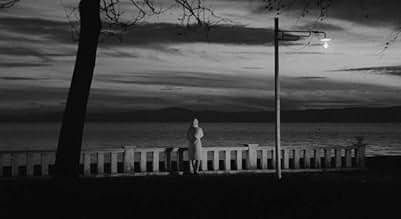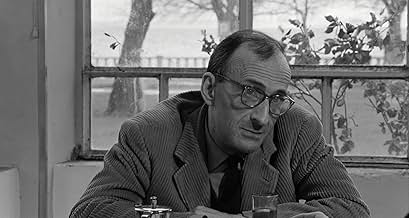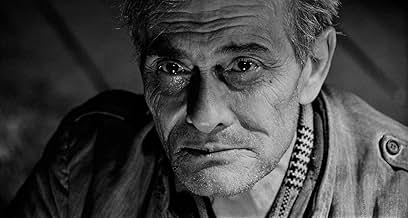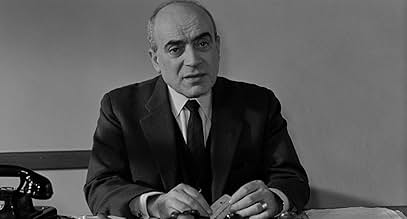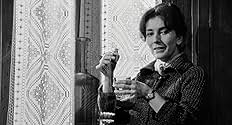NOTE IMDb
7,0/10
1,7 k
MA NOTE
Ajouter une intrigue dans votre langueWhile visiting his favorite resort town during the off-season, a novelist investigates the apparent suicide of a woman he was infatuated with.While visiting his favorite resort town during the off-season, a novelist investigates the apparent suicide of a woman he was infatuated with.While visiting his favorite resort town during the off-season, a novelist investigates the apparent suicide of a woman he was infatuated with.
- Réalisation
- Scénario
- Casting principal
Pia Lindström
- Adriana
- (as Pia Lindstrom)
Pier Giovanni Anchisi
- Francesco - Photographer
- (as Piero Anchisi)
Anna Maria Gherardi
- Servant Girl
- (as Anna Gherardi)
Jean Rougeul
- The Journalist
- (non crédité)
Avis à la une
I saw this on late-night local TV in the early 70s, tolerably dubbed, under the title LOVE, HATE AND DISHONOR, and was immediately taken by it's eerie, VAMPYRE-like style.
It never played on TV again, and in the late 70s to 90s I searched for it in vain. I did catch a reference to it under the title Possessed in the Encyclpedia of Horror Movies.
Finally found a poor quality English-subtitled VHS a few years back from VideoSearch of Miami and enjoyed it once again. I guess I have to add two more lines of text to meet the minimum requirement to post. I hope this is enough
It never played on TV again, and in the late 70s to 90s I searched for it in vain. I did catch a reference to it under the title Possessed in the Encyclpedia of Horror Movies.
Finally found a poor quality English-subtitled VHS a few years back from VideoSearch of Miami and enjoyed it once again. I guess I have to add two more lines of text to meet the minimum requirement to post. I hope this is enough
The Lady in the Lake is often seen as a precursor to the Giallo style that would reach it's peak in the early seventies; and I can certainly see why. However, I would say that the film is closer to a supernatural mystery film than a Giallo and it also shares a lot in common with the popular American film noir style; stemming from it's picture, execution and subject material. The film is very much of the high quality variety and director Luigi Bazzoni takes time and a lot of care to ensure that the film is haunting and mysterious as possible - which pays dividends as the plot starts to pan out. We focus on Bernard; a writer who goes to spend some time in a dilapidated hotel where he spent some time the previous year. Once he gets there, he begins searching for Tilde; a young maid he fell in love with during his previous visit, but he's surprised by the news that Tilde killed herself. However, it would appear that there is more to the apparent suicide as Bernard is shown a picture suggesting she was pregnant...
The film is directed by Luigi Bazzoni, who go on to make one of the best seventies Giallo's with the excellent The Fifth Cord as well as one of the oddest genre films with Footsteps in 1975. There's also a writer's credit for Death Laid an Egg writer-director Giulio Questi, so rather unsurprisingly - The Lady of the Lake is a rather bizarre film! It starts off simple enough and the first half of the movie is pretty easy viewing, but then things start to get a bit stranger in the second half and it becomes easy to loose the plot. It's lucky then that there's more than enough to keep the audience otherwise entertained. The cinematography is absolutely gorgeous and the black and white picture allows the director to capture a real macabre and moody atmosphere. The town in which the film takes place is a masterpiece within itself - the ghostly local population in particular is memorable. The plot comes back together towards the end and the film does give closure to its central plot line. Overall, The Lady of the Lake will probably not please all viewers; but it's a very well made mystery and anyone that considers themselves a fan of Italian cinema should check it out!
The film is directed by Luigi Bazzoni, who go on to make one of the best seventies Giallo's with the excellent The Fifth Cord as well as one of the oddest genre films with Footsteps in 1975. There's also a writer's credit for Death Laid an Egg writer-director Giulio Questi, so rather unsurprisingly - The Lady of the Lake is a rather bizarre film! It starts off simple enough and the first half of the movie is pretty easy viewing, but then things start to get a bit stranger in the second half and it becomes easy to loose the plot. It's lucky then that there's more than enough to keep the audience otherwise entertained. The cinematography is absolutely gorgeous and the black and white picture allows the director to capture a real macabre and moody atmosphere. The town in which the film takes place is a masterpiece within itself - the ghostly local population in particular is memorable. The plot comes back together towards the end and the film does give closure to its central plot line. Overall, The Lady of the Lake will probably not please all viewers; but it's a very well made mystery and anyone that considers themselves a fan of Italian cinema should check it out!
Having been very impressed by co-director Bazzoni's subsequent "The Fifth Cord", I have been very keen to see "The Lady of the Lake" since I first heard of it four or five years ago when i read Adrian Luther Smith's Excellent "Bloody and Black Lace" - a definitive collection of giallo reviews. It appears, under the title "The Possessed" in the obscure and rare titles section, along with a superlative review. Subsequent attempts to track the title down were in vain, until I popped into El Corte Ingles on my most recent Spanish holiday and found it on Filmax's "Giallo" collection under the title "El Mujer Del Lago". This is the only DVD outing I've ever heard of and there were both pros (a fantastic anamorphic print) and cons (it's Spanish and Italian only, with Spanish subs) - the cons apply as I'm an English speaker, but I was able to manage enough Spanish (with my dictionary at hand) to navigate through this beautiful, atmospheric film in Spanish with subs showing.
It's as good as it's advance word suggests - an ice cool, incredibly shot mood piece which emerges as a giallo only in hindsight, as at the time it was filmed, the concept hadn't been formed and we were still four years away from the giallo cycle proper which was initiated by the box office success of Argento's "The Bird with the Crystal Plummage" and Martino's "The Case of the Scorpion's Tail" amongst others.
The plot: A writer returns to the small town where he had vacationed previously. he's keen to meet up with his former maid, Tilde, with whom he had enjoyed a romance previously. However, she isn't there and the locals are not keen on talking about why. As he goes through the town, casual encounters build up an atmosphere of menace as everyone seems to be brushing her untimely death under the carpet. The writer presses on in his investigations, seeking the facts behind her death and finding an awful lot of problems lying beneath the town's impassive surface, but in doing so unleashes the pitch black heart of darkness that lies within this film's conclusion.
In terms of style, this is far away from the post-Argento iconography of the giallo. There are no black leather gloved killers here, no stalk and slash killings. All of the (physical) violence occurs off camera. But this remains one of the most claustrophobic, oppressive films of it's time. Much of the drama unfolds within the walls of the hotel, with flashbacks, fantasies and the present unfolding in this space. The film it feels most like is Renais' "Last year At marienbad", but with a more defined narrative. I suspect a lot of the time shifts come from co-screenwriter Gulio Questi, who would later return to the editing styles shown here in his own films such as "Django Kill... If you live, shoot!". Bazzoni contributes his unnerving eye for architecture as counterpoint and subtext to the story (he's on a par with Michael Mann in this respect).
This is a film about love, all types of love, from the casual to the obsessive, and the film gradually cranks up the tension until the conclusion. I hope that a wider audience will be able to embrance this with a DVD release from an outfit such as No Shame or Blue Underground. In the meantime, I'd advise anyone who cares about atmospheric horror/ thriller cinema to pick up the Spanish release, which can be had for a remarkable price (I paid 8.95).
It's as good as it's advance word suggests - an ice cool, incredibly shot mood piece which emerges as a giallo only in hindsight, as at the time it was filmed, the concept hadn't been formed and we were still four years away from the giallo cycle proper which was initiated by the box office success of Argento's "The Bird with the Crystal Plummage" and Martino's "The Case of the Scorpion's Tail" amongst others.
The plot: A writer returns to the small town where he had vacationed previously. he's keen to meet up with his former maid, Tilde, with whom he had enjoyed a romance previously. However, she isn't there and the locals are not keen on talking about why. As he goes through the town, casual encounters build up an atmosphere of menace as everyone seems to be brushing her untimely death under the carpet. The writer presses on in his investigations, seeking the facts behind her death and finding an awful lot of problems lying beneath the town's impassive surface, but in doing so unleashes the pitch black heart of darkness that lies within this film's conclusion.
In terms of style, this is far away from the post-Argento iconography of the giallo. There are no black leather gloved killers here, no stalk and slash killings. All of the (physical) violence occurs off camera. But this remains one of the most claustrophobic, oppressive films of it's time. Much of the drama unfolds within the walls of the hotel, with flashbacks, fantasies and the present unfolding in this space. The film it feels most like is Renais' "Last year At marienbad", but with a more defined narrative. I suspect a lot of the time shifts come from co-screenwriter Gulio Questi, who would later return to the editing styles shown here in his own films such as "Django Kill... If you live, shoot!". Bazzoni contributes his unnerving eye for architecture as counterpoint and subtext to the story (he's on a par with Michael Mann in this respect).
This is a film about love, all types of love, from the casual to the obsessive, and the film gradually cranks up the tension until the conclusion. I hope that a wider audience will be able to embrance this with a DVD release from an outfit such as No Shame or Blue Underground. In the meantime, I'd advise anyone who cares about atmospheric horror/ thriller cinema to pick up the Spanish release, which can be had for a remarkable price (I paid 8.95).
This early giallo has the look of Bazzoni's later The Fifth Cord and the mood of his last film Footprints On the Moon, and once again the director impresses with a mix of noir-ish visuals and people thinking a lot.
Bernardo is a burned out writer who, following a failed relationship, heads to a hotel on the edge of a lake where he was once infatuated with a maid named Tilde. He plans to take their relationship further, but only if he can find her. He should have probably asked where she was while he was on the phone booking a room because it turns out that Tilde committed suicide the previous winter. Maybe he booked through Trivago or something and didn't get the chance to speak to a real person.
Someone in town confides in Bernardo that there's a rumour going around town that as well as ingesting poison Tilde must also have accidentally slashed her own neck with a knife too, which sets off Bernardo on a quest to find out what really happened to this woman he was technically stalking. Seriously - at one point we get a flashback to Bernardo spying on Tilde getting some from a mysterious horny stranger.
The mystery deepens as certain characters in the hotel start behaving strangely. First off there's the owner's daughter Irma, who is upset that the family's reputation is shattered, then there's her brother Mario and his weird wife who barely talks and walks around the lake at midnight, then there's the owner himself, whose happy, servile façade begins to slip as Bernardo goes snooping around the place.
Although there's not a lot of action in this one the general moodiness of the piece is cranked way up. Just like the brilliant Fifth Cord, Bazzoni uses light sources a lot here and often has his actors standing in front of harsh lighting, saving the weirdest light tricks for when Bernardo is either fantasising about the suspects motives or having one of many vivid dreams. There's quite a lot to compare to Footprints on the Moon as well, with one lonely character in a deserted holiday resort trying to figure some strange puzzle out.
For a really early giallo, and for Bazzoni's debut, this is a slick, well made film. It would be a good double-bill with Libido and The Third Eye (an early giallo with all the nastiness in place).
Bernardo is a burned out writer who, following a failed relationship, heads to a hotel on the edge of a lake where he was once infatuated with a maid named Tilde. He plans to take their relationship further, but only if he can find her. He should have probably asked where she was while he was on the phone booking a room because it turns out that Tilde committed suicide the previous winter. Maybe he booked through Trivago or something and didn't get the chance to speak to a real person.
Someone in town confides in Bernardo that there's a rumour going around town that as well as ingesting poison Tilde must also have accidentally slashed her own neck with a knife too, which sets off Bernardo on a quest to find out what really happened to this woman he was technically stalking. Seriously - at one point we get a flashback to Bernardo spying on Tilde getting some from a mysterious horny stranger.
The mystery deepens as certain characters in the hotel start behaving strangely. First off there's the owner's daughter Irma, who is upset that the family's reputation is shattered, then there's her brother Mario and his weird wife who barely talks and walks around the lake at midnight, then there's the owner himself, whose happy, servile façade begins to slip as Bernardo goes snooping around the place.
Although there's not a lot of action in this one the general moodiness of the piece is cranked way up. Just like the brilliant Fifth Cord, Bazzoni uses light sources a lot here and often has his actors standing in front of harsh lighting, saving the weirdest light tricks for when Bernardo is either fantasising about the suspects motives or having one of many vivid dreams. There's quite a lot to compare to Footprints on the Moon as well, with one lonely character in a deserted holiday resort trying to figure some strange puzzle out.
For a really early giallo, and for Bazzoni's debut, this is a slick, well made film. It would be a good double-bill with Libido and The Third Eye (an early giallo with all the nastiness in place).
Glorious first film from Luigi Bazzoni, who would go on to make, The Fifth Cord and Footprints. Here with wonderful b/w cinematography from Barboni we have a straightforward enough, if noirish, beginning, gradually deepening into something resembling a gothic horror before developing before our very eyes into something more resembling a giallo. Always good to look at and with persuasive and involving dialogue, this engages from the start and although the tale is leisurely told, occasionally resembling Last Year At Marienbad, we never loose interest. Yet another near lost gem wonderfully restored thanks to Arrow. Oh and I almost forgot, we get a dreamy substantial cameo from the lovely Virna Lisi.
Le saviez-vous
- ConnexionsReferenced in The Legend of the Bazzoni Brothers (2019)
Meilleurs choix
Connectez-vous pour évaluer et suivre la liste de favoris afin de recevoir des recommandations personnalisées
- How long is The Possessed?Alimenté par Alexa
Détails
- Date de sortie
- Pays d’origine
- Langue
- Aussi connu sous le nom de
- The Possessed
- Lieux de tournage
- Brunico, Bolzano, Trentino - Alto Adige, Italie(lakeside town: street views, shops, train station)
- Sociétés de production
- Voir plus de crédits d'entreprise sur IMDbPro
- Durée
- 1h 25min(85 min)
- Couleur
- Mixage
- Rapport de forme
- 1.85 : 1
Contribuer à cette page
Suggérer une modification ou ajouter du contenu manquant

